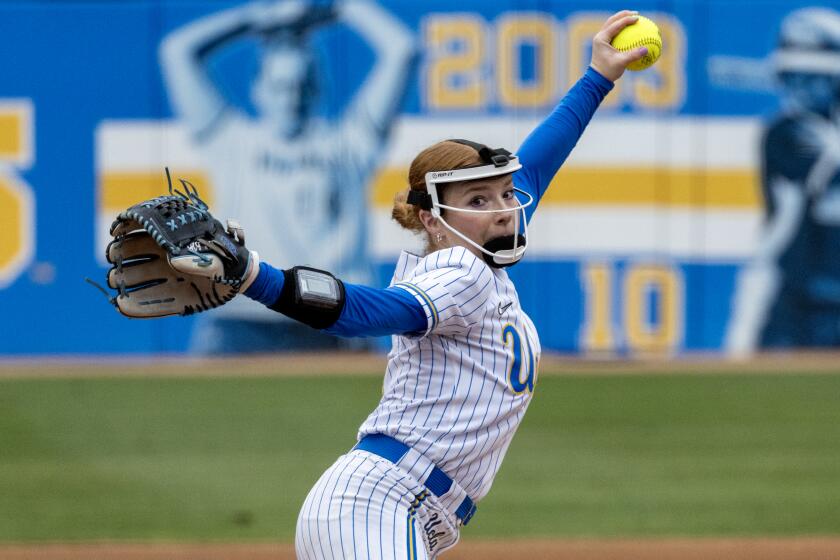Assistant Football Coaches Won’t Be Cut
- Share via
The jobs of hundreds of assistant football coaches were saved Wednesday when Division I-A schools voted to change a planned revision in coaching staffs.
As part of cost-cutting legislation developed by the NCAA Presidents Commission, delegates a year ago adopted a measure limiting Division I-A football coaching staffs to one head coach, eight full-time assistant coaches and four “restricted-earnings” coaches whose annual salaries could not exceed $12,000. The measure, which was scheduled to go into effect this year, cut one full-time assistant from most staffs.
However, Division I-A schools Wednesday adopted a modified version of the legislation that will increase the number of allowable full-time assistant coaches to nine. Two graduate assistant coaches will replace the four “restricted-earnings” coaches.
Opponents of the coaching staff cut argued that having “restricted-earnings” coaches would lead to the sort of abuses that have been associated with part-time coaches. There have been cases in which salaries of such coaches have been improperly supplemented through outside sources. “We have already seen coaches trying to figure out ways to get around the rule,” said Georgia Athletic Director Vince Dooley, formerly the school’s football coach.
Penn State Coach Joe Paterno pointed out that the alternative legislation would be just as cost effective as the legislation that was adopted last year.
“I have a very difficult time cutting out a mature coach when you presidents are asking us to graduate kids and keep them out of trouble,” Paterno said.
Although the Presidents Commission opposed it, the coaches got their way. It was, however, the only substantial reversal of legislation adopted last year.
Paterno and Dooley weren’t so fortunate in attempts to revise legislation mandating cuts in coaches’ recruiting contacts.
“Put yourself in (the recruits’) shoes,” Paterno said. “If you are considering four jobs, you want the opportunity to talk with people.
“People think recruiting is mashing people, but it’s dialogue.”
In addition to strengthening academic requirements for freshman eligibility, Division I schools adopted legislation designed to keep enrolled athletes on course to graduating.
The legislation will require athletes, starting with their third year of enrollment, to complete a progressive percentage of course requirements in a degree program as well as post GPAs based on their schools’ minimum standards for graduation.
The legislation is due to take effect in the 1992-93 school year.
Division I schools also passed legislation that will restrict the amount of academic work athletes can do in summer school.
Under the measure athletes must do 75% of the work used to fulfill the NCAA’s satisfactory progress requirements during the regular academic year.
Speaking in support of the legislation, Jerry Kingston, faculty athletic representative at Arizona State and a member of the NCAA’s Academic Requirements Committee, called it a means of discouraging athletes from using summer school as “an academic cure-all.”
Division I schools voted down a measure--sponsored by members of the Atlantic Coast Conference, the Big Ten and the Southeastern Conference--that would have required junior college transfers who had failed to meet the NCAA’s freshman eligibility requirements to sit out a year after enrolling at Division I schools.
More to Read
Go beyond the scoreboard
Get the latest on L.A.'s teams in the daily Sports Report newsletter.
You may occasionally receive promotional content from the Los Angeles Times.






